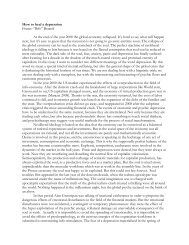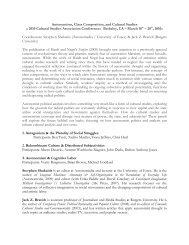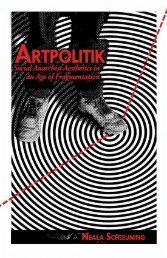nanopolitics handbook - Minor Compositions
nanopolitics handbook - Minor Compositions
nanopolitics handbook - Minor Compositions
Create successful ePaper yourself
Turn your PDF publications into a flip-book with our unique Google optimized e-Paper software.
and a desubjectivation that is a becoming plural, a multiplication, a practiceof conjunctions where everything tends to move away from what it is, fromhow it gets established, towards encounters and new compositions. One is adesubjectivation which affirms separation, the other affirms ways of connectingalternative to the sanctioned ones (nuclear family, work, nation...).And in the midst of all this, a shakeup. In the middle of the session, asharmonies seem possible and gentle tones abound, we take a break to eat.Someone is impatient to leave the high-security university building to smokeoutside. The university is full of switches, gateways and borders, like a prisononly those with the right keys can enter and access it. A neoliberal institutionlike any other, built on paranoia, ‘health and safety’, restrictions, exploitations,divisions, competition. The aspiring smoker presses the fire alarm button nextto the door, mistaking a fire alarm button for the switch to open the door(there is no switch to open the door : only access card holders can swipe opendoors). So a fire alarm goes off in the midst of our tonal experience, with aloud sound that makes your hair stand and makes your muscles tense.With this shrill sound comes a whole other world of relating: a fight eruptsbetween our smoker friend and the security guard who rushes to reprimandus. The fire brigades have to be sent, even if this was a mistake. Some of ustry to mediate as agitation turns into anger in the heated back and forth, andvoices go shaky with frustration. We’re all barefoot, sandwiches in hand, standingaround by ugly prison-like university gates. The tone gets harsher, pitchhigher, frequencies clash. The guard (from Nigeria) asks our smoker (fromBrasil) for her name, to complete the protocol. Our friend rejects this request,suspecting that it’s because of her accent that she has to give her name (memoriesof border controls perhaps, of racist experiences perhaps). She feelsvulnerable and gets angry. The guard in turn gets upset about this crowd oflargely white barefoot people trying to hamper him doing his job, fulfillingthe protocol. He insists all the more. A minor instance of accent (or suspicionthereof) gives rise to a large shift in tone, changing our bodies.Eventually we can return into the building, not least thanks to somecareful mediations, and inside we find ourselves sitting in a circle trembling,overwhelmed by this experience. Securitisation meets postcolonial sensitivitiesmeets class differences. How to talk, to make sense of what just happened,from the point of view of tonality? Tone has become quite tangible to us inthis hour, in a way contrasting with the beginning of our session. Our protectednanospace meets ‘the outside’, subject of many <strong>nanopolitics</strong> conversations.‘How to connect with the world/s outside?’ we often ask. No simple or singleanswer of course, and as we felt so clearly this somatic work, we may wellwant to give up ideas of ‘inside’ and ‘outside’ in favour of more subtle and163










